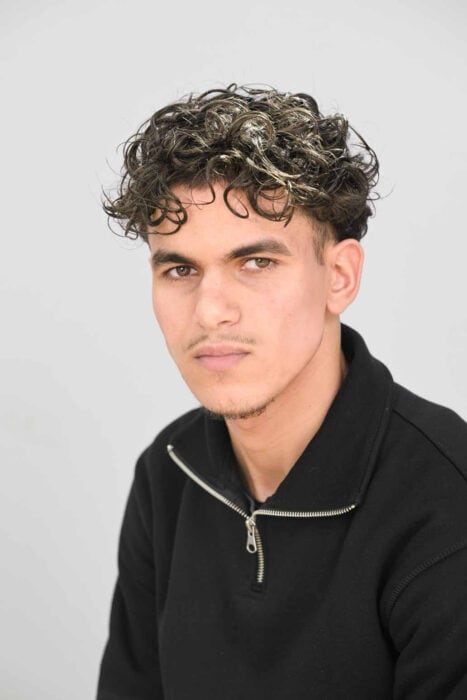Awwab Abdalsaed he/him

Doctoral researcher in Electrical and Electronic Engineering
Strategic Research Areas
My main research goal is to develop a commercially viable wireless smart sensor network (WSSN) that outperforms existing systems in enhancing the resilience and data-driven structural health monitoring of civil infrastructure. Focusing on efficiency, scalability, and reliability, I aim to design low-power, AI-enabled sensor architectures that deliver comprehensive structural insights and accelerate the digital transformation of smart infrastructure. Developing a way or integrating WSSN outputs with digital twins, my research will aim to enable real time visualisation, predictive maintenance and improved decision making in structural management.
Technically I have hands on experience with different Autodesk tools ive used within my undergraduate degree (e.g. Autodesk Robot, Fusion 360, etc…) and graphic design tools. These were developed through engineering and architectural design projects. I’ve also led design projects, demonstrating adaptability and initiative, and strong teamwork skills. Beyond academia, I’ll be holding a leadership role in a community focused organisation, where I’ll be coordinating a group. I also gained academic industry collaboration experience during my final year project with Fifty2 technology, working on simulation and structural modelling to bridge the gap between research and real-world engineering applications.
I decided to apply for DiveIn because of its unique, mission driven approach to research. Unlike the traditional programmes, DiveIn focuses on interdisciplinary collaboration which brings different perspectives to tackle complex real-world challenges. My experience balancing responsibilities outside of university with my academic studies has taught me resilience, empathy, and the value of inclusive teamwork and supportive research environments. With DiveIn, I’m motivated to collaborate across disciplines and with external partners to transform technology into practical solutions and to cause meaningful impact within society. I also see DiveIn as an opportunity to deepen my skills in interdisciplinary collaboration, data and computational analysis and industry engagement which are essential for impactful innovation.
Outside of Engineering, I enjoy sketching, playing table tennis, cooking, and learning Mandarin.
AI-Enabled Wireless Smart Sensor Networks for Resilient Structural Health Monitoring
Structural health monitoring (SHM) plays a crucial role in ensuring the safety and resilience of civil infrastructure. However, conventional wired systems remain limited by high installation costs, maintenance demands, and poor scalability [1]. Wireless smart sensor networks (WSSNs) have emerged as a transformative alternative, offering flexible, low-cost, and scalable monitoring solutions. Despite this progress, key challenges and limitation exist related to power efficiency, data throughput, and long-term reliability [2,3].
This project aims to develop an AI-enabled WSSN that enhances efficiency, scalability, and reliability through event-triggered sensing, multimeric data acquisition, and edge computing approaches. It will then be scaled so the system will integrate with digital twin environments to enable real-time visualisation and predictive maintenance.
This research will advance SHM toward autonomous, adaptive, and scalable frameworks and delivering actionable insights that enhance infrastructure safety, sustainability, and performance. It also contributes to the UK’s BeyondNetZero and Bridging the digital divide missions through the development of AI-integrated digital twins for smart and resilient infrastructure.
References
[1] M. Abdulkarem, K. Samsudin, F. Z. Rokhani, and M. F. A. Rasid, “Wireless sensor network for structural health monitoring: A contemporary review of technologies, challenges, and future direction,” Structural Health Monitoring, vol. 19, no. 3, pp. 693–735, 2019, doi: 10.1177/1475921719854528.
[2] X. Yu, Y. Fu, J. Li, J. Mao, T. Hoang, and H. Wang, “Recent advances in wireless sensor networks for structural health monitoring of civil infrastructure,” Journal of Infrastructure Intelligence and Resilience, vol. 3, p. 100066, 2024, doi: 10.1016/j.iintel.2023.100066.
[3] J. S. Jishna, S. Lekshmy, and Y. Jerrin, “Wireless Sensor Networks for Structural Health Monitoring,” IOSR Journal of Electronics and Communication Engineering (IOSR-JECE), vol. 10, no. 5, pp. 71–75, Sep.–Oct. 2015, doi: 10.9790/2834-10527175.
As my research focuses on developing an AI-enabled wireless smart sensor network (WSSN) for resilient structural health monitoring, I welcome collaborations with academics and industry partners that are interested in advancing smart infrastructure technologies. The aim is to integrate real time sensing, edge computing and digital twin environments to enhance data driven decision making. I’m happy to collaborate with researchers and organisations wishing to explore or apply this methodology in civil, structural, or environmental engineering context. I’m keen to share my expertise with any interested collaborators.
The areas below are some examples:
- Industrial partners working on sensor systems, digital twin integration, or infrastructure management.
- Engineers and data scientist’s ones that specialise in IoT, embedded systems, and AI/ML.
- Urban planners and sustainability researchers addressing the challenges of smart and resilient cities.
- Policy makers and stakeholders seeking to implement data-informed strategies for infrastructure safety and sustainability.
